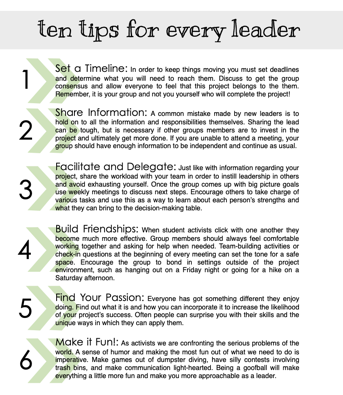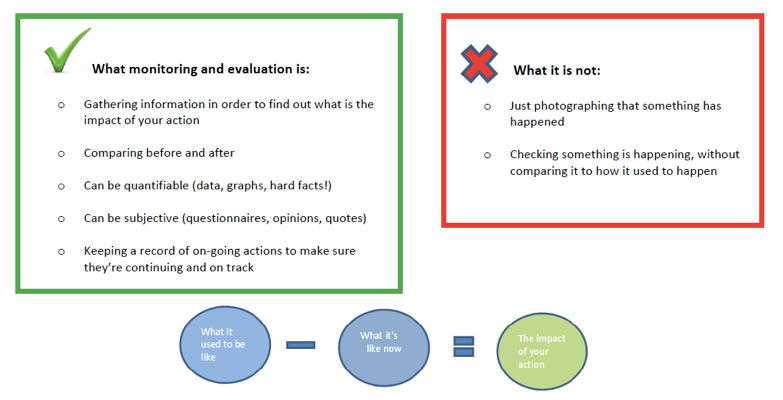1 Getting Started

1.1 FORMING AN ECO CREW
It is important to find a group of hard-working and motivated people to be part of the EcoCrew for Plastic Free Campus to be effective. This group will carry out most of the duties for managing single use plastic on campus.
This module has been developed with the Plastic Pollution Coalition, who incorporate a useful resource from postlandfill.org. These show best practices for leading this project.
How to recruit and motivate EcoCrew members
The EcoCrew are essential to the programme as they are more than volunteers: they will be fellow leaders and organizers who will get Plastic Free Campus going.
Here are important resources that your EcoCrew should review together and understand before starting:
1A Laying the Groundwork – complete this survey first
Need to Know 1C Introduction – The Challenge
The EcoCrew should include at least one representative from each sector of the school:
· Teachers: can act as a guide and mentor for the EcoCrew and support necessary changes within the administration
· School administration: for example, the headmaster or principal. It is unlikely they can attend all meetings, but keep them informed so they can champion the project – also to identify what solutions are feasible.
· Technical Services: can help navigate procurement and waste management services and apply recommended changes.
· Parent or PTA member: can help support changes in homes and encourage other parents
· Students from different age groups: to get support across the school and encourage change at all levels
When assembling your EcoCrew, consider:
- Building leadership, responsibility, and accountability
- Make sure all members have a defined role in the crew
- Members should feel as if their involvement is necessary for PFC success
- Different skills; great speakers, good researchers, video makers, artists for posters, writers for social media, debaters, slam poets, singer/song writers, school radio presenters, languages
- Consider holding informal recruitment meetings to present the PFC challenge to potential EcoCrew volunteers and answer questions
These positions may include:
1. Captain *
2. Monitor *
3. Communicator *
4. Volunteer coordinator
5. Class Representative
6. Faculty Liaison
7. Others – design the group you need
* = Key Roles - Required
Key EcoCrew Roles
EcoCrew Captain to:
- organise EcoCrew meetings
- be the “face” of the project when only one person can be
- keep track of the EcoCrew and progress of modules
- ensure task asignments are allocated and completed
EcoCrew Monitor to:
- gather information and data
- measure impact
- track lessons learned
- make sure the Checklist for each Module is completed
EcoCrew Communicator to:
- be the key communications leader
- coordinate responses from the school community
- be the contact point for the EcoCrew
- to prepare videos and other media to showcase progress
Other EcoCrew positions:
· define these roles and responsibilities
Launching the EcoCrew
Get all the volunteers together to:
- ensure there is a good mix of skill sets and diversity
- where is the EcoCrew strong and weak and are new recruits needed?
- agree roles
- agree initial assignments
- agree next steps
Motivation
Have some fun! Nothing helps team spirit more than recognising when everyone has been working hard and taking time together to appreciate progress.
Consider getting together at lunch, after school, or on weekends to hang out and celebrate!
Top Tip: Engage with the global Plastic Free Campus community by publishing your aims as an EcoCrew and uploading them to social media with the tag #PFC_PlasticFreeCampus
1.2 MANAGING THE ECO CREW
Plan how to keep the EcoCrew coordinated and committed:
- see Pages 3 to 10 in the PLAN Manual for inspiration
· How to keep the team motivated, aligned and on track
· Weekly check-ins (tips for success)
· Quarterly reviews
· End of year finale
Decide how to identify and celebrate achievements
Decide how to capture lessons learned, measuring impact and how to communicate these.
· Within the EcoCrew
· With the broader school community
· With other schools via the PFC Academy and social media
Going plastic-free is a long term process and not everything may be accomplished in one school year. This programme is designed to be run by different EcoCrews year to year. Therefore it may make sense to plan how to hand-over to the next EcoCrew.
· Conduct exit interviews and testimonials and capture ideas for how to do this better
· Ask people what they got out of the experience individually
· Remind individuals what they stated as their personal development objectives and ask how they feel they progressed with them
· Write hand-over notes for the next EcoCrew
· Publicly celebrate the success and the contributions of the EcoCrew
· Review who is leaving and recruit and see what skills need to be brought in and what is needed to ensure diverse representation
· Recruit new members
· Integrate members into team
1.3 CAMPUS WASTE AUDIT
A waste audit is effective at detecting the types and amounts of waste produced on campus. By identifying exactly what is brought onto campus and what is thrown away, work can begin to reduce the amount of waste being produced. A waste audit can also identify opportunities for cost savings.
It is important to conduct this audit at the very start of the PFC project to have good baseline of data for the awareness campaign.
Conduct two audits: one at the start and one at the end of the Plastic Free Campus project, to help measure the impact. It is important to quantify the changes being made, for example, on the amount of waste generated on campus, or the amount of plastic purchased by the school.
Before starting the Campus Waste Audit first complete 1A Laying the Groundwork which gives a high level view on what is already being done on campus to reduce plastic use and waste.
Next complete the Campus Waste Audit. Download the Audit Form then return and upload it when you complete the Checklist.
Top Tips: Zero-waste is difficult to achieve, aim for a low-plastic campus within reasonable limits. Consider the impact before removing or reducing something: For example, reducing plastic in the infirmary, or first-aid kits around schools may not be practical.
1.3 MEASURING IMPACT AND LESSONS LEARNED
The most significant impact of this module is the Campus Waste Audit. There are two key figures that will make it easier to recognise the progress made when the second audit is done at the end of the project.
- #1 PET Water Bottles – total ending up in recycling or waste – both brought from home or purchased at school
- Single-use plastics in the cafeteria – cutlery, plates, cups
What were the challenges putting together the EcoCrew?
- Students?
- Faculty?
- Administration?
Top Tip: Here are some points to consider when measuring impact: Eco Schools Northern Ireland
